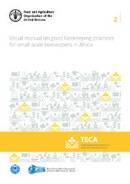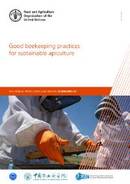Resources
Visual manual on good beekeeping practices for small-scale beekeepers in Africa
This manual is a visual, practical document on good beekeeping practices for sustainable small-scale beekeepers in Africa. It has been designed to serve as a beekeeping training tool and is a concise, practical reference document. The manual opens with an illustrated story of the damaging effect of certain practices adopted when collecting wild honey (honey hunting) and aims to spark interest among readers on how to harvest honey more sustainably. The second section presents the reader with the main beekeeping equipment and explains how the tools can be used to keep healthy bees and harvest quality honey. It ends with an overview of good beekeeping practices that will help the beekeeper produce good honey in a sustainable manner.
Good beekeeping practices for sustainable apiculture
Bees provide a critical link in the maintenance of ecosystems, pollination. They play a major role in maintaining biodiversity, ensuring the survival of many plants, enhancing forest regeneration, providing sustainability and adaptation to climate change and improving the quality and quantity of agricultural production systems. In fact, close to 75 percent of the world’s crops that produce fruits and seeds for human consumption depend, at least in part, on pollinators for sustained production, yield and quality. Beekeeping, also called apiculture, refers to all activities concerned with the practical management of social bee species.
YUNGA: THE POLLINATORS CHALLENGE BADGE
The POLLINATORS CHALLENGE BADGE is designed to help educate children and young people about the importance of pollinators for people and the planet, and how to help safeguard them against extinction. This material is appropriate for use in school classes, Guide or Scout groups or youth meetings generally. It includes a wide range of activities and ideas to stimulate learning about protecting pollinators.
Línea Base del Servicio Ecosistémico de la Polinización en Chile
Author: FAO
Levantamiento de información secundaria sobre el servicio ecosistémico de polinización para el Chile
A Quantitative Approach to the Socio-Economic Valuation of Pollinator-Friendly Practices: A Protocol for Its Use
Author: Garibaldi, L.A.; Dondo, M.; Hipólito, J.; Azzu, N.; Viana, B.F.; Kasina, M.
This publication provides an approach for the socio-economic valuation of pollinator-friendly practices at a landscape/farm level, with practical examples from Brazil and Kenya.






